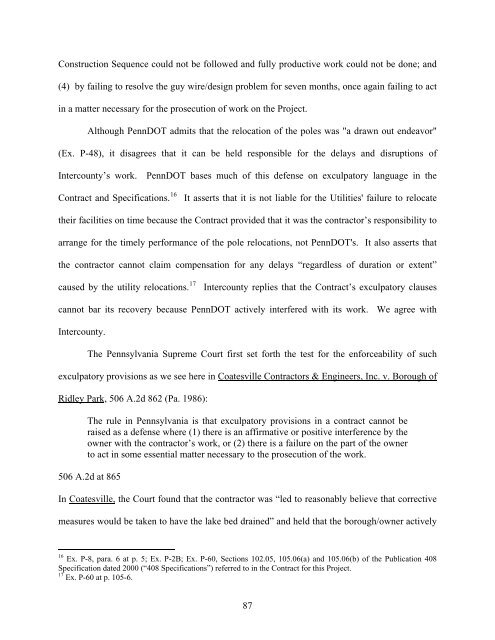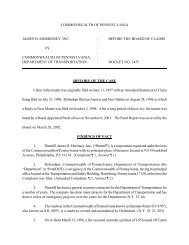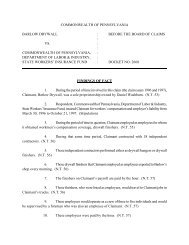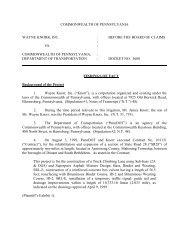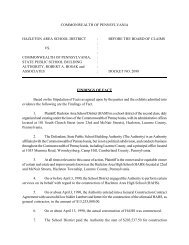3720 - Board of Claims
3720 - Board of Claims
3720 - Board of Claims
Create successful ePaper yourself
Turn your PDF publications into a flip-book with our unique Google optimized e-Paper software.
Construction Sequence could not be followed and fully productive work could not be done; and<br />
(4) by failing to resolve the guy wire/design problem for seven months, once again failing to act<br />
in a matter necessary for the prosecution <strong>of</strong> work on the Project.<br />
Although PennDOT admits that the relocation <strong>of</strong> the poles was "a drawn out endeavor"<br />
(Ex. P-48), it disagrees that it can be held responsible for the delays and disruptions <strong>of</strong><br />
Intercounty’s work. PennDOT bases much <strong>of</strong> this defense on exculpatory language in the<br />
Contract and Specifications. 16<br />
It asserts that it is not liable for the Utilities' failure to relocate<br />
their facilities on time because the Contract provided that it was the contractor’s responsibility to<br />
arrange for the timely performance <strong>of</strong> the pole relocations, not PennDOT's. It also asserts that<br />
the contractor cannot claim compensation for any delays “regardless <strong>of</strong> duration or extent”<br />
caused by the utility relocations. 17<br />
Intercounty replies that the Contract’s exculpatory clauses<br />
cannot bar its recovery because PennDOT actively interfered with its work. We agree with<br />
Intercounty.<br />
The Pennsylvania Supreme Court first set forth the test for the enforceability <strong>of</strong> such<br />
exculpatory provisions as we see here in Coatesville Contractors & Engineers, Inc. v. Borough <strong>of</strong><br />
Ridley Park, 506 A.2d 862 (Pa. 1986):<br />
The rule in Pennsylvania is that exculpatory provisions in a contract cannot be<br />
raised as a defense where (1) there is an affirmative or positive interference by the<br />
owner with the contractor’s work, or (2) there is a failure on the part <strong>of</strong> the owner<br />
to act in some essential matter necessary to the prosecution <strong>of</strong> the work.<br />
506 A.2d at 865<br />
In Coatesville, the Court found that the contractor was “led to reasonably believe that corrective<br />
measures would be taken to have the lake bed drained” and held that the borough/owner actively<br />
16 Ex. P-8, para. 6 at p. 5; Ex. P-2B; Ex. P-60, Sections 102.05, 105.06(a) and 105.06(b) <strong>of</strong> the Publication 408<br />
Specification dated 2000 (“408 Specifications”) referred to in the Contract for this Project.<br />
17 Ex. P-60 at p. 105-6.<br />
87


